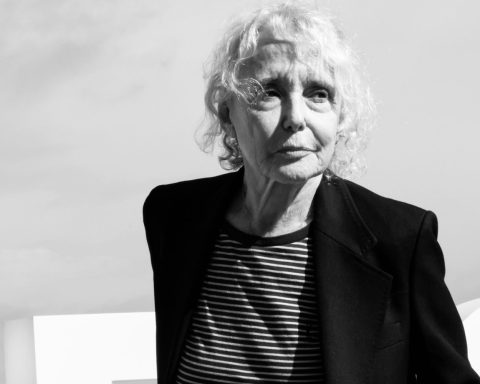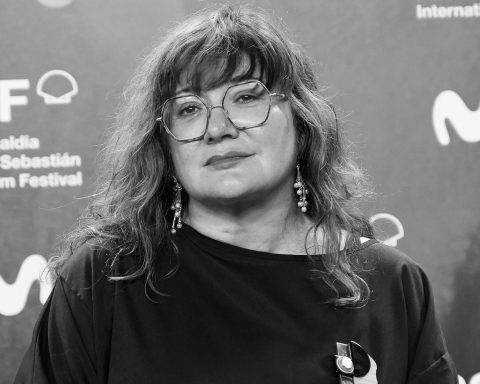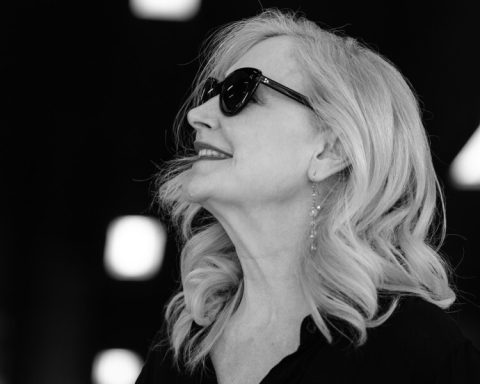Canadian writer and director Mary Harron first made an impact on the world of American independent cinema with her 1996 feature directorial debut “I Shot Andy Warhol.” The acclaimed film, which detailed the strange albeit short life of “S.C.U.M Manifesto” author Valerie Solanas, earned both an Independent Spirit Award nomination for Best Film and a Special Jury Award for star Lili Taylor at the 1996 Sundance Festival. The daughter of celebrated Canadian actor Don Harron, she was educated at Oxford University and began her career as a rock journalist. One of the founders of “Punk” magazine, the first publication dedicated solely to punk rock, Harron was the first writer to interview the Sex Pistols for an American publication. She also worked for a number of British publications, including “New Musical Express,” for which she wrote a history of the Velvet Underground, and Melody Maker, for which she wrote a detailed history of Andy Warhol and the Factory. Harron began her film career as the director of a number of documentaries for BBC TV and Channel Four. She also made six short films about pop culture, including one entitled “How to Make an Oliver Stone Movie.” Following “I Shot Andy Warhol,” her acclaimed feature directorial debut, Harron began adapting, along with co-writer Guinevere Turner, Brett Easton Ellis’ controversial novel “American Psycho” for the screen. The film was released in 2000 to mostly negative reviews, but has now reached cult status. She followed it up with “The Notorious Bettie Page” and “Charlie Says” among other works in both film and television.
Tara Karajica talks to Mary Harron about feminism and film and her latest feature, “Dalíland,” that follows a young gallery assistant who, in 1973, goes on a wild adventure behind the scenes as he helps the aging genius Salvador Dalí prepare for a big show in New York.
You’ve had such a wild, interesting and eclectic career before becoming a filmmaker. How and why did you make the switch to filmmaking to be the rule–breaking film cult director you are today?
Mary Harron: Thank you! Well, you know, it came kind of naturally. My father was an actor, so I grew up in my early years around the movie theater business. When I was five or six, we lived in Hollywood, and my dad was under contract, so I had some connection to that world. And when I was younger, I thought maybe I would write movies. I started as a journalist, but I really didn’t have any role models as a director, and I thought it was something very difficult and technical. I’m not a very technical person, so I thought it would be very hard. But then, as a journalist, I moved back to London where I spent my teenage years and a lot of my friends were working for the BBC, doing documentaries, and their work seemed very exciting. And so, I made the transition from journalism to documentary, which is not so hard. In a way, it’s like telling real life stories on camera instead of writing. And then, while I worked for many years as a researcher in documentaries, and that went up, we were working on a documentary about Warhol. And, I was doing lots of research then when I discovered the story of Valerie Solanas. That became my first movie, but I already wanted to direct at that point. I was not very confident about it, but I think it was what I wanted more than anything in the world, really.
You make films about people that fascinate you. What was about Dalí that fascinated you so much? How did Dalíland come about?
M.H.: I loved his work, but I didn’t know much about him as a person. And then, the project came to me through Ed Pressman, who recently passed away, a producer who did American Psycho with me, and he sent me some existing material and I wasn’t that interested in it. I showed it to my husband, who I write with sometimes, and he wrote a whole memo that gave a whole new way of doing the story. It was already about Dalí in the 70s, but it was to focus on his fear of death, and what this was doing was an older artist as life is slipping away from him, and he’s spinning as fast as he can with these parties and these distractions, and death was always sort of hovering over him and we really liked that idea. And also, to concentrate on the marriage – this very difficult marriage.
Actually, the film is not so much about him as a person as it uses him a case study for what I would call a deconstruction of fame, gender, wealth and power. Can you elaborate on that?
M.H.: I think the film is a bit of a Rorschach test, and it means different things to different people. But, at one point, we were going to call it “In the Court of Dalí,” because it was a little kingdom, much like Warhol’s Factory. It has one central, very powerful figure and then people are drawn, moths to a flame. And, people are cherished and become stars into that world, but sometimes they’re exiled and sometimes they’re thrown out of that world. So, it’s like a court with favorites. And then, favorites are thrown out sometimes. So, it had that dynamic and Gala is the Queen. Also, she’s an unhappy Queen at this point. There’s all this tension between them.
I was about to say that. Actually, Dalí is not the ruler of his court or his world, but it’s actually Gala. How do you see Gala, as well as other female characters in the film such as Amanda Lear, for example?
M.H.: Gala gets a very bad rep. Most accounts of Gala are just focused on what an awful person she was and how mean and domineering she was. She would kick people and fight with people. She was kind of crazy. But, at the same time, I loved Gala because she’s so completely honest. She just says exactly what she thinks and she behaves exactly as she wants to. So, she’s like the reverse of the classic muse. The classic muse is sort of silent and beautiful and somewhat of a victim. And, Gala is just running the show.
Amanda, in a way, looked at Dalí as a sort of surrogate family and Amanda was like the daughter, the favorite daughter and the beautiful muse, but not someone with whom Dalí had a sexual relationship. And, James is, for a while, like the favorite son, but he’s also a sort of beautiful object and in some ways an object of desire. And so, you could do a whole film about Amanda being trans, being this complex figure, but we loved her book and her very loving and kind portrait of Dalí in that book. So, we wanted to stress that this was a loving and beneficial relationship. The one with Gala was very fractious while the one with Amanda was more benign and happier.
Can you talk about the research? How did you go about it? What exactly were you looking for? What was the best or the craziest thing that you’ve learned about Dalí that you didn’t know or that isn’t in the film, actually?
M.H.: Oh, good question! When I am researching, I sort of just dive straight in. I don’t know exactly what I’m looking for. In documentary, you do a deep dive into the subject and then the form of the story appears through immersing yourself in all this material. You’ll find somehow what is interesting to you and then, like a sculpture appearing from a block of marble, the story is in there and you have to find it. We went to Cadaqués with the people who knew Dalí. We read – there are so many books about him! Someone said everybody who knew Salvador Dalí wrote a book about him. His hairdresser wrote a book… I mean, everybody wrote a book. We talked to a lot of people who met him. Actually, his hairdresser in New York, people would run across him and pick up a little details here and there. He had stories. One of them was that somebody described getting into an elevator with Dalí and him just looking at the buttons and not knowing how to press them to use the elevator. He was that sort of a stranger in the world; he just had wanted somebody to do everything for him. As it says in the film, he can’t pay for a taxi on his own… Then, there was that sort of sexual stuff and the voyeurism, but I think everybody knows that – that’s well-documented. I didn’t realize how completely sexless the marriage was for such a kind of romantic and intense relationship, lasting over fifty years.
Are you a feminist? If so, how does it inform your filmmaking?
M.H.: Yes, I assume I would be classified as one – depends on what you mean by feminist. I think my films have always taken a female perspective and a I am a product of the 70s. So, I’m sort of a product of 70s feminism in that first breaking away and that wave of stepping back and looking at the patriarchy. So, yes. I mean, without it, I would not be a filmmaker clearly. Without feminism, I don’t see how I would have ever done what I’ve done. I’m not sure what people mean now about feminism, but that’s what it means to me.
How do you see the situation of women in film today?
M.H.: I think people worry about it. When I started out directing television in the 80s, there were hardly any women film directors. I remember going to see The Piano and it was amazing that Jane Campion had made this movie and it was a big success that was a landmark. And now, however, as much of a boys’ club as it may be, the film industry is radically different to when I was starting out. And also, as I was starting out as a young director, there was so much casual sexism that you just dealt with as a matter of course, that you just had to ignore. I think, now, people are much more likely to call someone out on that.
In that sense, how do you manage to stay true to yourself in today’s film industry?
M.H.: Difficult question. I think sometimes I do jobs for money, but I’m trying to always do something that really interests me, whether it’s more commercial or whether it’s not something I’ve necessarily written. I think I’ve chosen my projects carefully. I’d be very persistent. It’s very, very hard to get a film made. And, it always was. I don’t feel it’s any easier. They always take seven years, nine years to get made. You have to be very, very persistent. And also, I think I learned this very early on from Killer Films, when Christine Vachon said: “We create the budget, the aesthetic to match the budget, so however much money we get, we’ll make the film and we’ll find a style that works” and that’s always been my kind of mantra.
You obviously deal with a lot of film critics and criticism today and, as a film as a critic yourself, how do you deal with that today? How do you see film criticism today? How do you take it when your work is being criticized?
M.H.: I mean, it’s always difficult. I also have to always remind myself that I got things wrong when I was a critic. You’re having to make snap judgments and often, you make a big pronouncement on something and then a couple years later, you look back and you’re like: “I really got that wrong. I didn’t see it.” Sometimes, when something is disturbing or new or different, you don’t get it, so I always try to remind myself about that. It’s funny because mostly I’ve had a lot of bad reviews in my time. Most of my films do not get a great reception. American Psycho was rotten on Rotten Tomatoes for years, and Bettie Page as well. Now, everybody speaks about them in admiring terms. Charlie Says, actually, had an initially bad response and I feel like that’s one of my best films and I think it’s kind of finding its place. So, I think you just have to take a deep breath and remember what you got wrong. I say to myself: “Maybe this is payback for the things that I wrote,” and I just try and think about the long term and not so much about how a film does now. How some will do in ten years and will people still watch them in ten years. The only thing that’s difficult now is that I do think that the Rotten Tomatoes thing is very difficult because it creates a sort of false rating on a film. I think it’s great that people can weigh in, but it has been given way too much power over determining the release of a film or how many theaters it’s in and all that. So, that’s a little worrying.
How do you feel your films age in today’s world that is very heightened in terms of awareness?
M.H.: I think I’ve been really lucky. I think that’s why I’m still making films, actually. I mean, American Psycho is way more successful now than it was when it came out. Way more. That’s thanks to the Internet memes and things, but I’m very grateful for that. And, it seems to have hit a young audience. The same with Bettie Page; it has lasted much longer than you would have thought. I hope this is going to be true for Charlie Says as well.
What are your next projects?
M.H.: My next two projects that I’m thinking of are both based on novels. So, I’m going to leave the real world behind for a bit. I mean, it’s all real world. I’m interested in politics. I’m interested in the social setting of every story. Even though sometimes my films are not naturalistic, there’s always some kind of social or political background to them even when they’re kind of dreamlike. American Psycho’s kind of dreamlike, but it’s very much in a real moment in American History. But I think I’m just going to leave the real-life stories aside for a while.
Photo credits: Courtesy of Magnolia Pictures.







